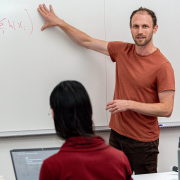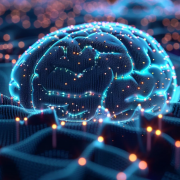June 6, 2025 - 11:00 am
Neural activity patterns can encode competing hypotheses about which landmark will lead to the correct destination.
Anne Trafton | MIT News
When navigating a place that we’re only somewhat familiar with, we often rely on unique landmarks to help make our way. However, if we’re looking for an office in a brick building, and there are many brick buildings along our route, we might use a rule like looking for the second building on a street, rather...
May 6, 2025 - 4:00 pm
Singleton Auditorium (46-3002)
Nidhi Seethapathi, MIT
TBA
May 6, 2025 - 8:15 am
Contact Yohan J. John http://kempnerinstitute.harvard.edu
What is the logic underlying human and animal intelligence? This is the motivating question behind the research of Samuel J. Gershman, a Kempner Institute associate faculty member and professor in the Department of Psychology. Gershman’s lab studies a wide spectrum of phenomena related to intelligence, ranging from the complexity of human cooperation to learning in single-celled organisms...
April 30, 2025 - 9:45 am
The brain’s astounding cellular diversity and networked complexity could show how to make AI better.
By Yasemin Saplakoglu, Staff Writer
In 1943, a pair of neuroscientists were trying to describe how the human nervous system works when they accidentally laid the foundation for artificial intelligence. In their mathematical framework (opens a new tab) for how systems of cells can encode and process information, Warren McCulloch and Walter Pitts...
April 25, 2025 - 4:00 pm
McGovern Reading Room (46-5165)
Adi Shamir, The Paul and Marlene Borman Professorial Chair of Applied Mathematics, Weizmann Institute of...
TBA
April 4, 2025 - 11:00 am
by Tomaso Poggio, MIT
It was with deep sadness that I learned the premature passing of Sayan Mukherjee in Leipzig, Germany on March 31st. Professor Sayan Mukherjee, born in India, completed his academic education at MIT in BCS in my CBCL group in 2001. Initially he remained there and at the nearby Broad Institute on a Sloan Postdoctoral Fellowship. From 2004 to 2022, he was at Duke University, Durham, North Carolina, where he was promoted to...
March 31, 2025 - 12:00 pm
Written By Adam Conner-Simons
How do neural networks work? It’s a question that can confuse novices and experts alike. A team from MIT’s Computer Science and Artificial Intelligence Lab (CSAIL) says that understanding these representations, as well as how they inform the ways that neural networks learn from data, is crucial for improving the interpretability, efficiency, and generalizability of deep learning models.
With that mind, the CSAIL...
March 9, 2025 - 3:30 pm
Infants naturally learn about the world through a process of incremental understanding, building foundational concepts before tackling more complex ones. For example, infants recognize animacy - distinguishing between living and non-living entities - before learning about goal-directed behavior. This stepwise learning allows them to make accurate predictions about future events, such as expecting a hand to grasp an object rather than move...
March 7, 2025 - 2:30 pm
By William C. Mao and Veronica H. Paulus, Crimson Staff Writers
BOSTON — More than 500 researchers, physicians, and students rallied at Boston Common on Friday to protest President Donald Trump’s efforts to cut federal funding for scientific research, lay off federal employees, and eliminate diversity, equity, and inclusion programming at universities.
Protestors packed a corner of the park, just yards away from the Massachusetts State House, to...
March 6, 2025 - 9:30 am
Singleton Auditorium (46-3002)
Kelsey Allen, DeepMind
Abstract: Every human culture we know of creates and re-purposes objects as tools to achieve their goals. These capabilities come so easily to us that we often forget how complex these behaviors are. Despite the universality of tool use in people, only a handful of other animals use objects in this...
March 4, 2025 - 4:00 pm
Singleton Auditorium (46-3002)
Joel Leibo, senior staff research scientist at Google DeepMind and professor at King's College London
Abstract: What is appropriateness? Humans navigate a multi-scale mosaic of interlocking notions of what is appropriate for different situations. We act one way with our friends, another with our family, and yet another in the office. Likewise for AI, appropriate behavior for a comedy-writing...
February 11, 2025 - 4:00 pm
Singleton Auditorium (46-3002)
Thomas Serre, Brown University
Abstract: Recent advances in artificial intelligence have been mainly driven by the rapid scaling of deep neural networks (DNNs), which now contain unprecedented numbers of learnable parameters and are trained on massive datasets, covering large portions of the internet. This scaling has enabled...
January 29, 2025 - 6:00 pm
Our mission is to drive the development and adoption of AI-based solutions across a broad spectrum of computational methods, with a particular focus on the aerospace, automotive, and manufacturing sectors within the Italian industrial ecosystem.
Further details on the Institute’s distinctive features can be found at https://ai4i.it/distinctive-features/
The position offers a competitive salary and a starting grant, which successful candidates...
January 29, 2025 - 1:45 pm
Sometimes, it might be better to train a robot in an environment that’s different from the one where it will be deployed.
Adam Zewe | MIT News
A home robot trained to perform household tasks in a factory may fail to effectively scrub the sink or take out the trash when deployed in a user’s kitchen, since this new environment differs from its training space.
To avoid this, engineers often try to match the simulated training environment as closely...
January 6, 2025 - 5:45 pm
Data from macaque monkeys reveals flaws in deep neural networks
By Anne J. Manning, Harvard Staff Writer | Press contact
Among the marvels of the human brain is its ability to generalize. We see an object, like a chair, and we know it’s a chair, even when it’s a slightly different shape, or it’s found in an unexpected place or in a dimly lit environment.
Deep neural networks, brain-inspired machines often used to study how actual brains function...















